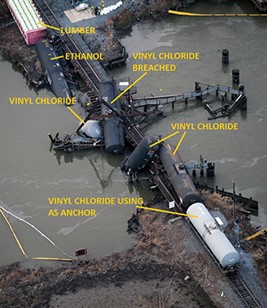

Conrail train derailment near Delaware River caused release of 23,000 gallons of gaseous vinyl chloride north of Philadelphia in 2012.
In the late afternoon of March 26, Philadelphia residents received a jarring emergency alert that it was not safe to drink or use the water. A chemical leak from a factory in Bristol threatened to contaminate the Delaware River water. For the next few days, the city’s water department continued the drinking water ban. Then early evening, March 28, Philadelphia Mayor Jim Kenney suddenly announced: “There was no problem — the water was safe to drink.” (Inquirer.com, March 29)
The sudden lack of potable water left nearly a million city residents in the lurch. Those with the means made a dash to suburban markets, where they waited in long lines for limited supplies, emptying shelves in a manner reminiscent of early COVID-19 days.
Those without resources, including cars — the majority of Philadelphians in one of the poorest major cities in the U.S. — relied on what bottled water was left at high-priced neighborhood delis, convenience stores and bodegas.
And several activists held a press conference March 27 to demand the city provide safe drinking water to all incarcerated workers in the city’s jail.
Yet throughout the entire crisis, city administrators made absolutely no effort to provide free bottled water to residents, including the incarcerated. On March 27, Philadelphians also learned that Mayor Kenney was aware of the leak when it first happened on March 24, but had said nothing for two days.
After reporting the crisis was over, the administration claimed that “tap water had been safe throughout the ordeal” and that the sudden notice on Sunday was made “out of an abundance of caution.” (Inquirer, March 28)
Conrail train derailment near Delaware River caused release of 23,000 gallons of gaseous vinyl chloride north of Philadelphia in 2012.
Long history of contaminant spills
According to CNN, the spill was the result of “equipment failure” at the Trinseo Altuglas Plc plant in Bucks County, which produces acrylic resins used in latex emulsions. (March 28) The site is part of a cluster of industrial companies north of Philadelphia along the Delaware River, which is the water source for most of the region.
Between 8,100 and 20,000 gallons of the water-based chemicals had leaked upstream of the Baxter Treatment Plant, which provides drinking water for 975,000 Philadelphia customers. The chemicals reported discharged included ethyl acrylate, methyl methacrylate and butyl acrylate — one of the contaminants found in the train derailment in East Palestine, Ohio, in February. All three chemicals can cause irritation of the eyes, skin and respiratory system, according to the Centers for Disease Control and Prevention. And butyl acrylate is flammable.
The spill on March 24 was not the Trinseo plant’s first. The $3 billion company has a long history of environmentally harmful, chemical accidents, including at least four contamination incidents, in 2010, 2012, 2014 and 2021. (Inquirer.com, March 27)
But Trinseo is not alone. Billypenn.com provided a short history of industrial accidents impacting Delaware River water, including a 2012 train derailment very similar to the one in East Palestine, Ohio. (March 29)
Like in many Black and Brown communities in cities large and small, confidence in local administrations to provide reliable water was already on shaky grounds.
Black community organizer and activist Gabriel Bryant told Workers World: “The recent Philadelphia water crisis is just another assault on the Black community, as we grapple with ongoing environmental injustices and neglect. Just six years ago around this time, we were fighting for clean water at West Philadelphia High School. Here we are again.
Bryant stressed “Knowing that elders and people with limited mobility would have challenges, getting to supermarkets and stores for water, is further proof that this government is not able to properly provide for its most vulnerable residents. The people have been shown consistently that we need a new, independent and noncapitalist means to access our most important resource to live.”
The epic struggle of the Palestinian people against the full weight of U.S. imperialism and…
The following report comes from the Bronx Anti-War Coalition organizers on a protest held in…
In the Canadian federal elections held on April 28, the Liberals won with 169 seats…
The following is Part 2 of a talk given by the author to a meeting…
Boston Students, professors and workers are confronting the Trump administration’s fascist crackdown at universities across…
Philadelphia Within days of Swarthmore students reviving a pro-Palestinian encampment on April 30, police arrested…